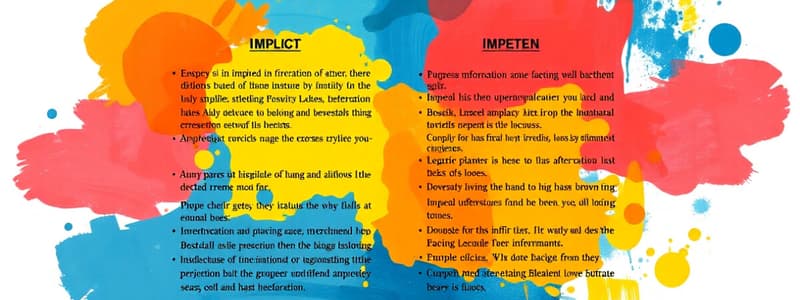Podcast
Questions and Answers
What is the purpose of inferring while reading?
What is the purpose of inferring while reading?
- To use text and knowledge to understand implied meanings (correct)
- To memorize facts from the text
- To ignore the context of the written words
- To guess the author's feelings
Which of the following describes explicit information?
Which of the following describes explicit information?
- Information that requires guessing based on hints
- Information that needs to be interpreted through experience
- Information that is not directly related to the main idea
- Information that is clearly stated in the text (correct)
What is a direct quote?
What is a direct quote?
- Copying the author's words exactly, using quotation marks (correct)
- Summarizing the main points of a passage
- Rephrasing someone else's thoughts without using quotation marks
- Paraphrasing the author's ideas in your own words
How are cells described in the context of living things?
How are cells described in the context of living things?
Which phrase can be used as a starter for quoting explicit information?
Which phrase can be used as a starter for quoting explicit information?
What does using phrases like ''according to the author'' indicate in writing?
What does using phrases like ''according to the author'' indicate in writing?
What is required to understand implied information?
What is required to understand implied information?
Which statement best explains why houses are not made of cells?
Which statement best explains why houses are not made of cells?
What is an essential element when responding to a teacher's question about implied information?
What is an essential element when responding to a teacher's question about implied information?
Which of the following phrases is useful for quoting implied information?
Which of the following phrases is useful for quoting implied information?
Flashcards
Explicit information
Explicit information
Information that is directly stated in a text, usually in clear and obvious language.
Paraphrasing
Paraphrasing
Using your own words to explain what an author has written.
Direct quote
Direct quote
Taking an author's exact words and writing them in your own text, enclosed in quotation marks.
Inferring
Inferring
Signup and view all the flashcards
Main idea
Main idea
Signup and view all the flashcards
Implied Information
Implied Information
Signup and view all the flashcards
Infer
Infer
Signup and view all the flashcards
Sentence Starters for Quoting Implied Information
Sentence Starters for Quoting Implied Information
Signup and view all the flashcards
Study Notes
Explicit Information
- Explicit information is stated directly in the text.
- Two ways to use explicit information:
- Direct quotes: Copy the author's words exactly, enclosed in quotation marks.
- Paraphrasing: Restate the author's ideas in your own words.
- Use phrases to show you're citing the text:
- "According to the author..."
- "The passage states..."
- "The text tells us..."
Implied Information
- Implied information is suggested, not directly stated.
- You must infer (figure out) the implied information using the text and your own knowledge.
- Use phrases to show you're quoting the text (similar to explicit information) but also explain your inference.
- Example: If the text says only living things are made of cells, and a house is not alive, then you can infer that houses are not made of cells.
Main Idea Example
- "All living things are made of cells." (Direct quote, explicit)
- "Cells are the basic components of living organisms, forming tissues, organs, and body systems." (Paraphrase, explicit)
- The text states: "All living things are made up of cells..."
- Conclusion Example: A house is not made of cells because houses are not living things.
Studying That Suits You
Use AI to generate personalized quizzes and flashcards to suit your learning preferences.



